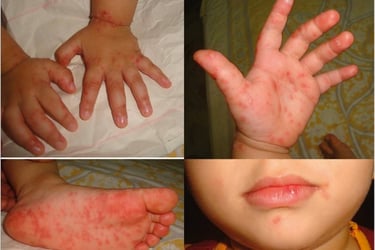Hand Mouth Foot Disease


Hand, Foot, and Mouth Disease (HFMD) is a common viral illness that primarily affects infants and children. Here's some key information about Hand, Foot, and Mouth Disease:
Cause: HFMD is most commonly caused by the Coxsackie virus, particularly the strains Coxsackievirus A16 and Enterovirus 71. These viruses are highly contagious and can spread through close personal contact, respiratory droplets, and contact with infected surfaces or feces.
Symptoms: The typical symptoms of HFMD include fever, sore throat, and a rash or blisters on the hands, feet, and inside the mouth. The rash may also appear on the buttocks and genital area. The blisters can be painful and may cause discomfort while eating or drinking.
Incubation Period: The incubation period for HFMD is usually 3 to 6 days, during which a person may be contagious even before symptoms appear. The illness usually lasts around 7 to 10 days.
Treatment: There is no specific treatment for HFMD. Most cases are self-limiting, and the symptoms can be managed at home with over-the-counter pain relievers for fever and discomfort. It's important to ensure adequate fluid intake to prevent dehydration, especially if the child has difficulty swallowing due to mouth sores.
Contagiousness: HFMD is highly contagious, especially during the first week of illness when the virus is most concentrated in the body. It's important to practice good hygiene, such as frequent handwashing with soap and water, covering the mouth and nose when coughing or sneezing, and avoiding close contact with infected individuals.
Prevention: To reduce the risk of HFMD, it's important to maintain good hygiene practices, such as regular handwashing with soap and water, especially after using the bathroom and before eating. Disinfecting frequently touched surfaces and objects can also help prevent the spread of the virus.
Complications: While most cases of HFMD resolve without complications, in rare cases, complications such as viral meningitis or encephalitis may occur. If you suspect complications or your child's symptoms worsen, it's important to seek medical attention.
If you suspect that you or your child has Hand, Foot, and Mouth Disease, it's recommended to consult with a healthcare professional for an accurate diagnosis and appropriate management of symptoms.
Emre Göçer
